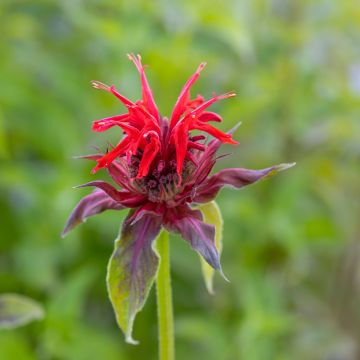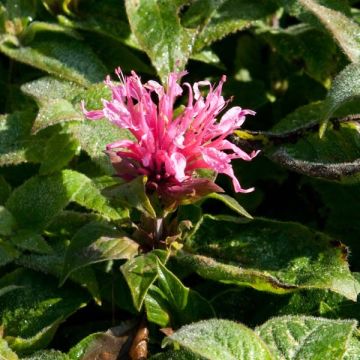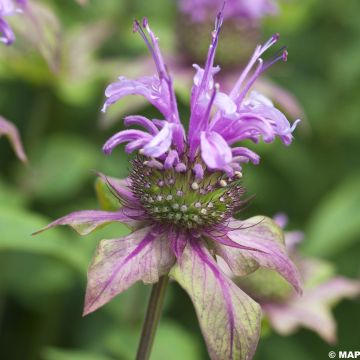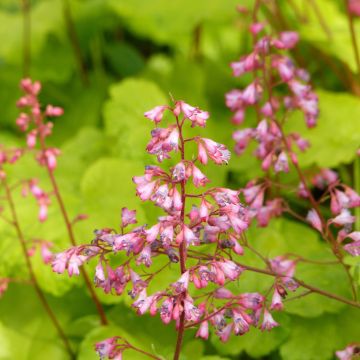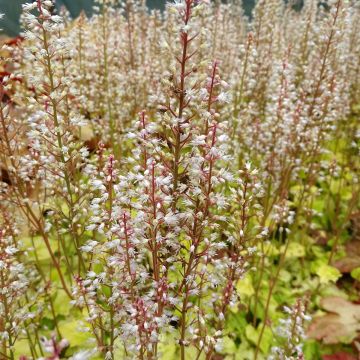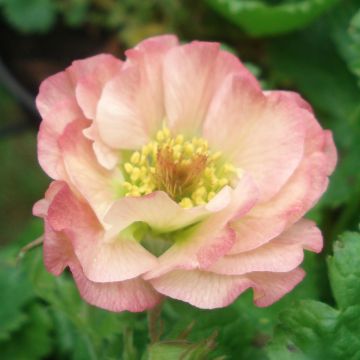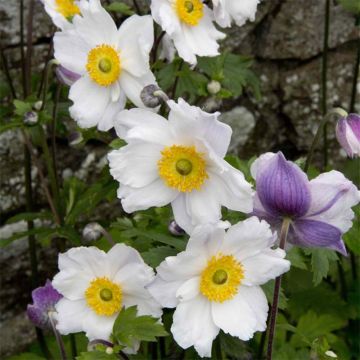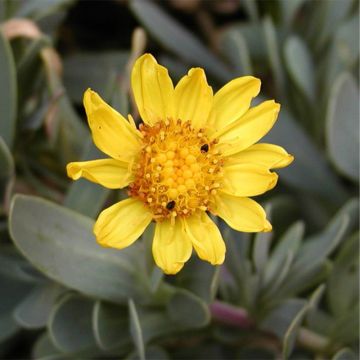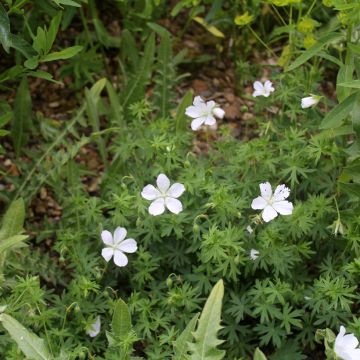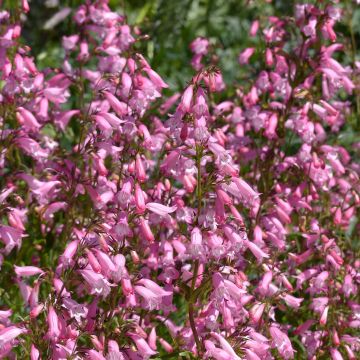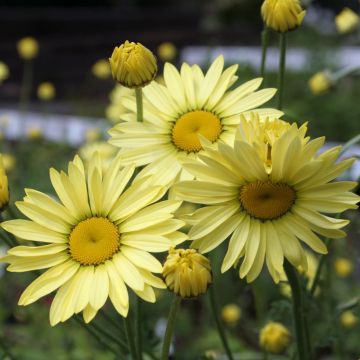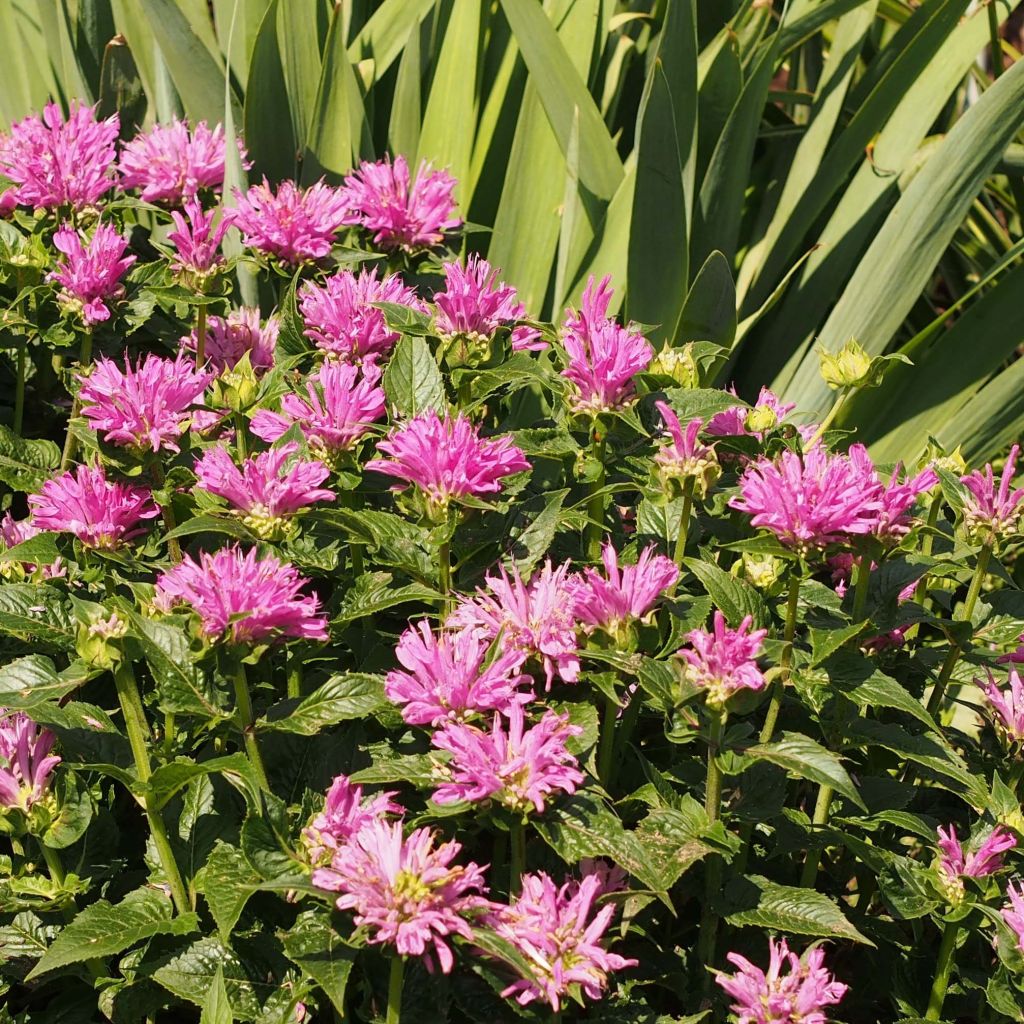

Monarda Petite Delight - Beebalm


Monarda Petite Delight - Beebalm
Monarda Petite Delight - Beebalm
Monarda x hybrida Petite Delight
Bergamot, Bee Balm, Oswego Tea, Horsemint
It is not specified in the description, but snails and/or slugs are fond of it. Despite being protected with chicken wire, it did not survive.
Yves, 08/04/2022
This item cannot be shipped to the selected country
Delivery charge from €5.90
More information
Schedule delivery date,
and select date in basket
This plant carries a 12 months recovery warranty
More information
We guarantee the quality of our plants for a full growing cycle, and will replace at our expense any plant that fails to recover under normal climatic and planting conditions.
From €5.90 for pickup delivery and €6.90 for home delivery
Express home delivery from €8.90.
Does this plant fit my garden?
Set up your Plantfit profile →
Description
Monarda 'Petite Delight' is a very compact version of Monarda didyma, delightful in summer with many large, fluffy, vibrant pink flowers abundantly produced above a superb cluster of grey-green, pleasantly aromatic leaves. It is a disease-resistant, adaptable and hardy variety, suitable for planting in ordinary soil that is not too dry. This lovely perennial plant works well at the front of sunny borders or in a pot on the terrace.
Monardas, or bee balms, belong to the mint family, which includes many medicinal and aromatic plants such as thyme, sage, and lavender. 'Petite Delight' is a recent Canadian hybrid, partly derived from Monarda didyma. This herbaceous perennial has a low, rounded clump habit 30 cm (12in) with a spread of 40 cm (16in). It flowers for 8 weeks in the heart of summer, from July to August. If the plant is cut back at the end of August, it will re-bloom in September. Its fluffy flowerheads are unique, composed of small, beautiful pink, curved flowers 4 to 5 cm (2in) long, surrounded by green bracts with an upright upper lip and a more spread-out lower lip divided into three lobes. These nectar-rich flowers are perched on stout, upright stems. The fairly dark gray-green foliage is ornamental and aromatic. With a characteristic citrus scent when crushed. The leaves are opposite on the stems, strongly veined, and toothed, 10 cm (4in) long and often attract insects. This plant is very hardy and can also be very long-lived if the growing conditions are good.
In the foreground of borders and flower beds, Monarda 'Petite Delight' pairs well with summer-flowering perennials in vibrant or pastel colours. Plant it in groups of six to create a beautiful mass of flowers and combine it with white (Fujiyama), mauve (Blue Paradise), red paniculate phlox, or Nepeta kubanica with violet flowers. It also pairs well in late summer with Aster lateriflorus, Campanulas lactiflora, Echinaceas, and many other perennial plants. It is suitable for planting on the banks of water features if the soil is well-drained. Its delightful flowers make beautiful bouquets.
It is worth noting that bee balm contains essential oils similar to those of thyme and its fresh or dried leaves or flowers can be used to make herbal tea. The young shoots can also be used in salads or stuffing.
Report an error about the product description
Monarda Petite Delight - Beebalm in pictures
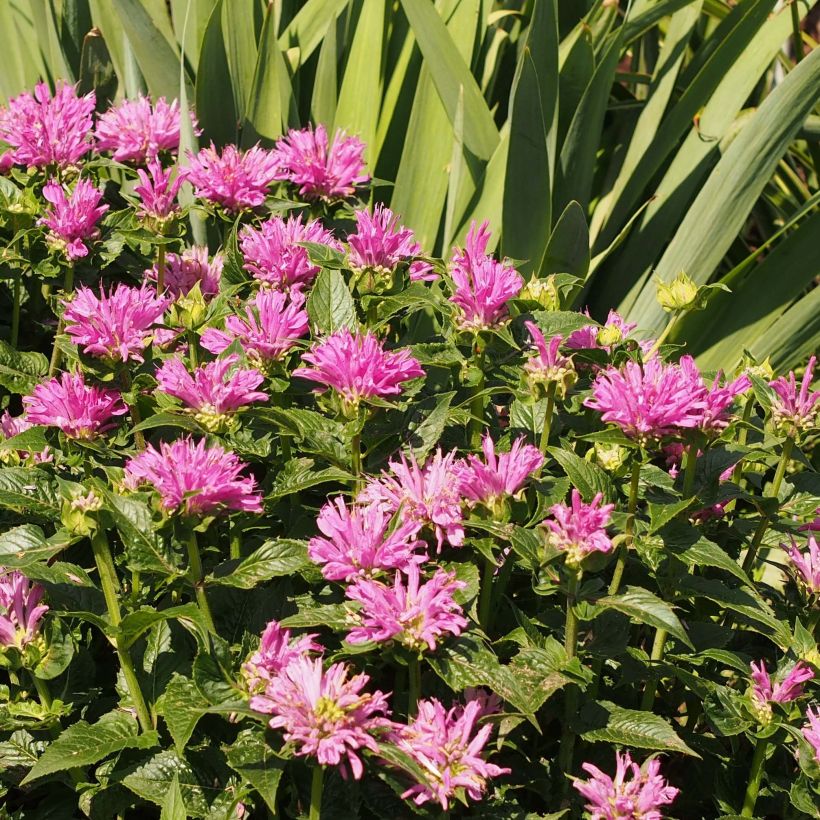

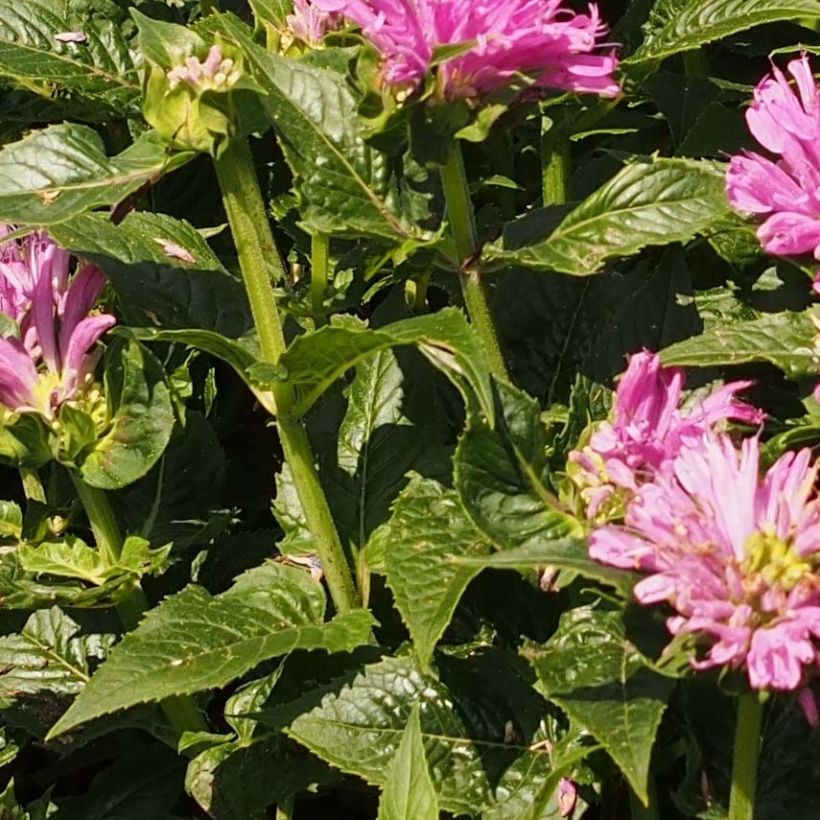

Flowering
Foliage
Plant habit
Botanical data
Monarda
x hybrida
Petite Delight
Lamiaceae
Bergamot, Bee Balm, Oswego Tea, Horsemint
Cultivar or hybrid
Other Monarda - Bee Balm
Planting and care
Monardas are perennial plants that are sensitive to excessively dry soils and overly hot exposures, which promote powdery mildew attack. This can also be a problem in moist soil. These plants need moist, but also very well-drained, rich, light and humus-rich soil. They also tolerate competition from other roots poorly. The Petite Delight variety does not normally suffer from powdery mildew if the growing conditions are correct. After planting, mulch the base with a layer of dead leaves or anything that can maintain soil moisture. Winter moisture is also detrimental to monardas, which is why good drainage is essential. If summer drought sets in summer, regularly water the plants (at the base). In autumn, cut back the withered stems to ground level. In poor soils, spread well-rotted compost over the crowns.
Planting period
Intended location
Care
-
, onOrder confirmed
Reply from on Promesse de fleurs
Summer flowering perennials
Haven't found what you were looking for?
Hardiness is the lowest winter temperature a plant can endure without suffering serious damage or even dying. However, hardiness is affected by location (a sheltered area, such as a patio), protection (winter cover) and soil type (hardiness is improved by well-drained soil).

Photo Sharing Terms & Conditions
In order to encourage gardeners to interact and share their experiences, Promesse de fleurs offers various media enabling content to be uploaded onto its Site - in particular via the ‘Photo sharing’ module.
The User agrees to refrain from:
- Posting any content that is illegal, prejudicial, insulting, racist, inciteful to hatred, revisionist, contrary to public decency, that infringes on privacy or on the privacy rights of third parties, in particular the publicity rights of persons and goods, intellectual property rights, or the right to privacy.
- Submitting content on behalf of a third party;
- Impersonate the identity of a third party and/or publish any personal information about a third party;
In general, the User undertakes to refrain from any unethical behaviour.
All Content (in particular text, comments, files, images, photos, videos, creative works, etc.), which may be subject to property or intellectual property rights, image or other private rights, shall remain the property of the User, subject to the limited rights granted by the terms of the licence granted by Promesse de fleurs as stated below. Users are at liberty to publish or not to publish such Content on the Site, notably via the ‘Photo Sharing’ facility, and accept that this Content shall be made public and freely accessible, notably on the Internet.
Users further acknowledge, undertake to have ,and guarantee that they hold all necessary rights and permissions to publish such material on the Site, in particular with regard to the legislation in force pertaining to any privacy, property, intellectual property, image, or contractual rights, or rights of any other nature. By publishing such Content on the Site, Users acknowledge accepting full liability as publishers of the Content within the meaning of the law, and grant Promesse de fleurs, free of charge, an inclusive, worldwide licence for the said Content for the entire duration of its publication, including all reproduction, representation, up/downloading, displaying, performing, transmission, and storage rights.
Users also grant permission for their name to be linked to the Content and accept that this link may not always be made available.
By engaging in posting material, Users consent to their Content becoming automatically accessible on the Internet, in particular on other sites and/or blogs and/or web pages of the Promesse de fleurs site, including in particular social pages and the Promesse de fleurs catalogue.
Users may secure the removal of entrusted content free of charge by issuing a simple request via our contact form.
The flowering period indicated on our website applies to countries and regions located in USDA zone 8 (France, the United Kingdom, Ireland, the Netherlands, etc.)
It will vary according to where you live:
- In zones 9 to 10 (Italy, Spain, Greece, etc.), flowering will occur about 2 to 4 weeks earlier.
- In zones 6 to 7 (Germany, Poland, Slovenia, and lower mountainous regions), flowering will be delayed by 2 to 3 weeks.
- In zone 5 (Central Europe, Scandinavia), blooming will be delayed by 3 to 5 weeks.
In temperate climates, pruning of spring-flowering shrubs (forsythia, spireas, etc.) should be done just after flowering.
Pruning of summer-flowering shrubs (Indian Lilac, Perovskia, etc.) can be done in winter or spring.
In cold regions as well as with frost-sensitive plants, avoid pruning too early when severe frosts may still occur.
The planting period indicated on our website applies to countries and regions located in USDA zone 8 (France, United Kingdom, Ireland, Netherlands).
It will vary according to where you live:
- In Mediterranean zones (Marseille, Madrid, Milan, etc.), autumn and winter are the best planting periods.
- In continental zones (Strasbourg, Munich, Vienna, etc.), delay planting by 2 to 3 weeks in spring and bring it forward by 2 to 4 weeks in autumn.
- In mountainous regions (the Alps, Pyrenees, Carpathians, etc.), it is best to plant in late spring (May-June) or late summer (August-September).
The harvesting period indicated on our website applies to countries and regions in USDA zone 8 (France, England, Ireland, the Netherlands).
In colder areas (Scandinavia, Poland, Austria...) fruit and vegetable harvests are likely to be delayed by 3-4 weeks.
In warmer areas (Italy, Spain, Greece, etc.), harvesting will probably take place earlier, depending on weather conditions.
The sowing periods indicated on our website apply to countries and regions within USDA Zone 8 (France, UK, Ireland, Netherlands).
In colder areas (Scandinavia, Poland, Austria...), delay any outdoor sowing by 3-4 weeks, or sow under glass.
In warmer climes (Italy, Spain, Greece, etc.), bring outdoor sowing forward by a few weeks.

































